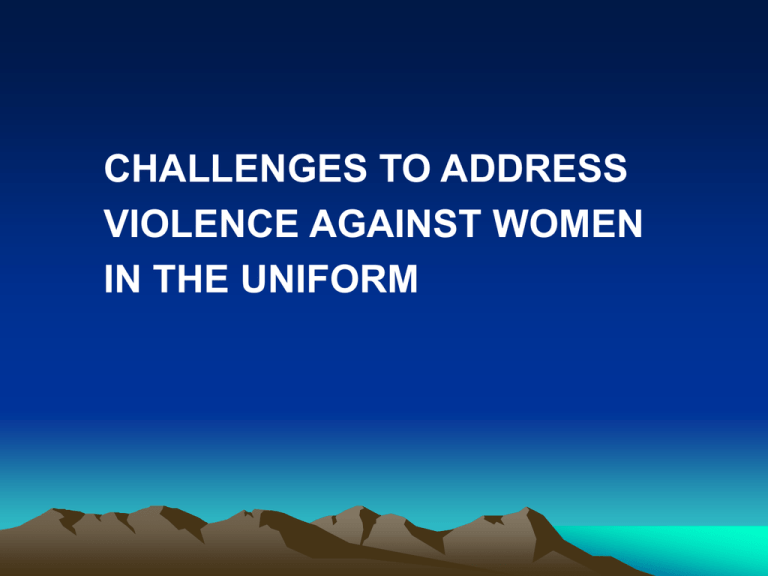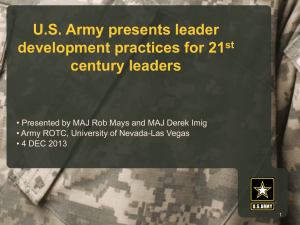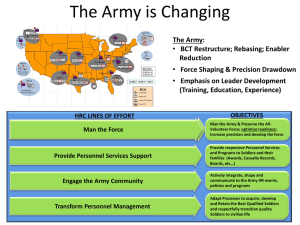
CHALLENGES TO ADDRESS
VIOLENCE AGAINST WOMEN
IN THE UNIFORM
NATIONAL WORKSHOP ON
VIOLENCE AGAINST WOMEN
HOTEL ASHOK
NEW DELHI
7TH MARCH, 2012
PRESENTATION
BY
MAJ. GEN. NILENDRA KUMAR
DIRECTOR
AMITY LAW SCHOOL, NOIDA
Military has a long and glorious tradition
of impeccable conduct.
All ranks are trained and taught to accord
due respect to the opposite sex.
Indian Army, whether operating on home
soil or beyond, is reputed and respected
for its honourable track record.
Its discipline and conduct has been
exemplary and above board.
• Plural marriage is prohibited. If one
contracts a marriage while he already has
a spouse living, his services are liable to
be terminated administratively.
• Evidence of domestic disharmony may
lead to a severe blot in his career profile
by merely reflecting in his performance
report that he is not happily married.
Tool to deal with cases of wives who have
been neglected and are not maintained.
Statutory remedy
• Army Act, 1950
• Sections 90 & 91
• Effective statutory powers are available
to the authorities to order payment of
maintenance to wife or dependent
children, whom, the military person is
found not to financially maintain.
However, the grant of maintenance will be
limited to the duration of one’s service in
the military.
Domestic violence
could be viewed in two ways
Domestic law is prohibited by law
The Protection of Women
from
Domestic Violence Act, 2005
(PWDVA)
Army Act Provisions
Section 69 would provide means to enforce
PWDVA
DOMESTIC VIOLENCE
in the case of military has to be seen in
the context of within a residence and also
by the military as a close social group.
NARROW VIEW
Violence within the confines of a
bungalow, quarter, flat or dwelling unit.
BROAD VIEW
BROAD VIEW
Violence within the military station,
cantonment or the area of operation.
SIZE OF THE PROBLEM
80% of dowry death and 80% of harassment
takes place in lower and middle class
society (Report of Institute of Development
& Communications).
Major component of the Army is drawn from
the same strata. Hence same level of
academic intellect social demands & ethos,
cultural values, mind set and economic
status.
MAIN REASONS FOR
DOMESTIC VIOLENCE
IN THE ARMY
1. Non familiar surroundings for those in
CILQ.
2. Lack of compatibility (education and
financial status).
3. Language barrier.
MILITARY IS ALIVE
TO
THE ISSUE OF
DOMESTIC VIOLENCE
New dimension is the grant of commission
to the women.
NUMBER OF WOMEN OFFICES IN
MILITARY
Army
Navy
Air Force
Male
Female
377
177
667
1072
7394
10760
AGENCY TO COMBAT
MILITARY’S INTERNAL EFFORTS TO
KEEP A WATCH & COUNSELLING
Army Wives Welfare Association
(AWWA)
CONCEPT
TO OPERATIONALISE
Unit level
Higher
formation
-
Family Welfare Centres
AWWA
Indian Armed Forces Wives
A help line
Call Asha at 9421016006
Monday – Saturday
8.30 am to 6.00 pm
helplineforiaw@gmail.com
LIMITATIONS
1.
2.
3.
4.
Personality oriented.
Lack of continuity in approach.
Unfamiliarity with local situations.
Limitation of expertise to deal with
medical and psychiatric assistance.
FALSE NOTION
Applications for grant of maintenance are
usually opposed by military units and
formations.
AWWA
has a continuing agenda
However, there have been a few cases to
the contrary. These could (arguably) be
viewed as aberrations.
These have been selected to depict
different working/situational incidents.
SEXUAL MISCONDUCT INVOLVING
1.
2.
3.
4.
5.
Junior woman officer
Wife of a colleague
Civilian subordinate
Civilian in counter insurgency situation
Peacekeepers
CASE STUDIES
1.
2.
3.
4.
5.
6.
7.
8.
Engineer in Chief’s case
Maj. Gen. A.K. Lal
Brigadier from Artillery
Registrar of Army Medical College
Manorama Devi matter
Major Rehman Hussain
Army Public School, Pithoragarh case
Pioneer Saiman
The first seven cases out of eight are of
this decade.
Brief facts of each of these cases
Engineer in Chief’s case
Maj. Gen. A.K. Lal
Brigadier from Artillery
Registrar of Army Medical College
Manorama Devi matter
Major Rehman Hussain
Army Public School, Pithoragarh case
Pioneer Salman
REASONS FOR DEVIANT
BEHAVIOUR
1. Service at isolated posts away from
families.
2. Access to arms and dominant position.
3. Subservient victims.
4. Encouragement due to cases hushed up
to safeguard Regiment’s reputation.
5. Use of women as human shields by
insurgents and reaction thereat.
DIFFICULTIES IN PROSECUTION
1.
2.
3.
4.
Language barrier
Unfamiliar neighbours
Ignorance and hesitation
Delayed identification parades
SUGGESTIONS
1. Increased role of AWWA as an NGO.
2. Greater activation of family welfare
centres.
3. Legal literacy.
4. Make formal investigations obligatory.
5. Transparent and prompt investigation.
CONCLUSION









